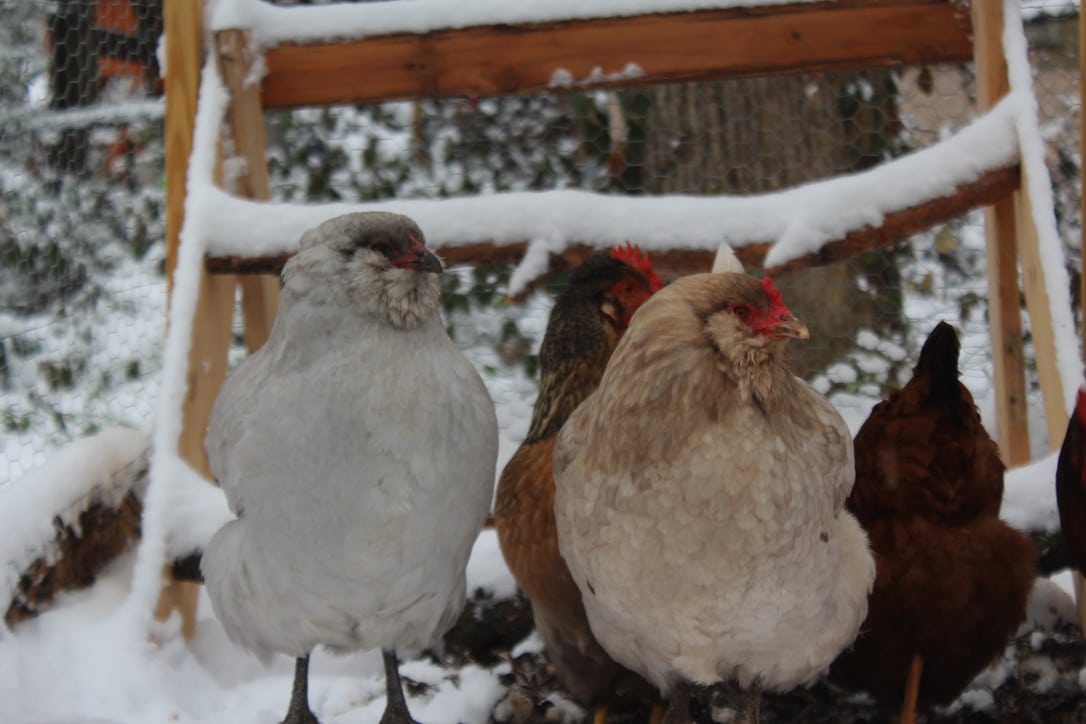
Last week I faced my first chicken ailment! I let my hens out in the morning and thought my hen, Sage, had a white eye. I instantly thought maybe one of the other chickens had pecked her and caused her to have a terrible wound. Although, my hens have never harmed one another before. I was able to pick her up and inspect what was going on and found she had strange little bubbles coming from one of her eyes. None of my other hens presented with bubbles. Just this one hen, who yesterday had been totally fine in photos!
I immediately hopped on google to try and figure out what was going on. After doing some serious hunting around, I found the suspected cause of the eye bubbles, Mycoplasmosis.
Mycoplasmosis, caused by Mycoplasma gallisepticum and/or M. synoviae, is a group of bacterial diseases that are common maladies of backyard chicken flocks.
Mycoplasmosis is a common upper respiratory infection of backyard chicken flocks that is transmitted vertically within some eggs from infected breeders to chicks, and horizontally via infectious aerosols and through contamination of feed, water, and the environment and by human activity on shoes, equipment, etc. The infection can lie dormant within a chicken until the chicken experiences stressors that ‘activates’ the infection symptoms.
This infection causes chickens to slow down laying eggs and sometimes will completely stop a chicken from laying. If not treated & managed, it can cause long term damage and potential death to a flock.
This was my first time ever dealing with a sick chicken as this is my very first flock. Worries that my whole flock was infected and I would have to potentially put my sweet hen Sage down weighed me down. After doing a considerable amount of research and riding an emotional roller coaster, I was still pretty unsure what was going to come of my hen and the flock as a whole. Fortunately, I have friends and family locally who also raise chickens & are willing to assist me when I have chicken concerns and questions!
I made an appointment with a local veterinarian so my hen could be seen and I could receive a prescription of medicine necessary to treat my flock.
My infected hen, Sage, was treated with an intramuscular injection of antibiotics. The rest of my flock was treated with a mixture of medication added to their water. Since they are currently under treatment, we are not eating any of their eggs. This isn’t too much of a loss for us though because only two hens are currently laying and even they have slowed down from the short winter days.
Mycoplasmosis stays with an infected chicken throughout its life. If it lays eggs and raises the chicks, those chicks will most likely have the disease as well. If you are concerned about your chickens possibly catching this infection, I would recommend searching for a breeder that is certified as M.G. free. This means their hens have been checked for the Mycoplasma gallisepticum infection. If your hens have had Mycoplasma gallisepticum, it may not be considerate to raise and sell chickens to others as it will spread the infection.
I believe that because I am in an urban setting, it would be considerably difficult to prevent mycoplasmosis because if anyone in my neighborhood has chickens that are infected and a wild bird eats there and picks it up and then comes over to snack at my home, my chickens are at risk again. I am curious if this infection is much less common for in flocks who are not in an urban setting as it would be more difficult for hens to pick up the virus unless they carried it on from their mother hen.
I will continue to practice hygienic chicken care to prevent my flock from experiencing any upper respiratory infections that could cause the MG to surface again. This means being diligent about the cleanliness of their run, water, and feeders. I will not be raising any chicks to sell to others so that the infection will not spread on.
Last week was quite the whirlwind of emotions and concerns. I am glad I was able to learn so much about this common chicken infection so that I can help prevent it in the future and educate others. Also, I amso glad to report that my girls are doing great. Espically Sage now that she has had around of antibiotics to help her get better.